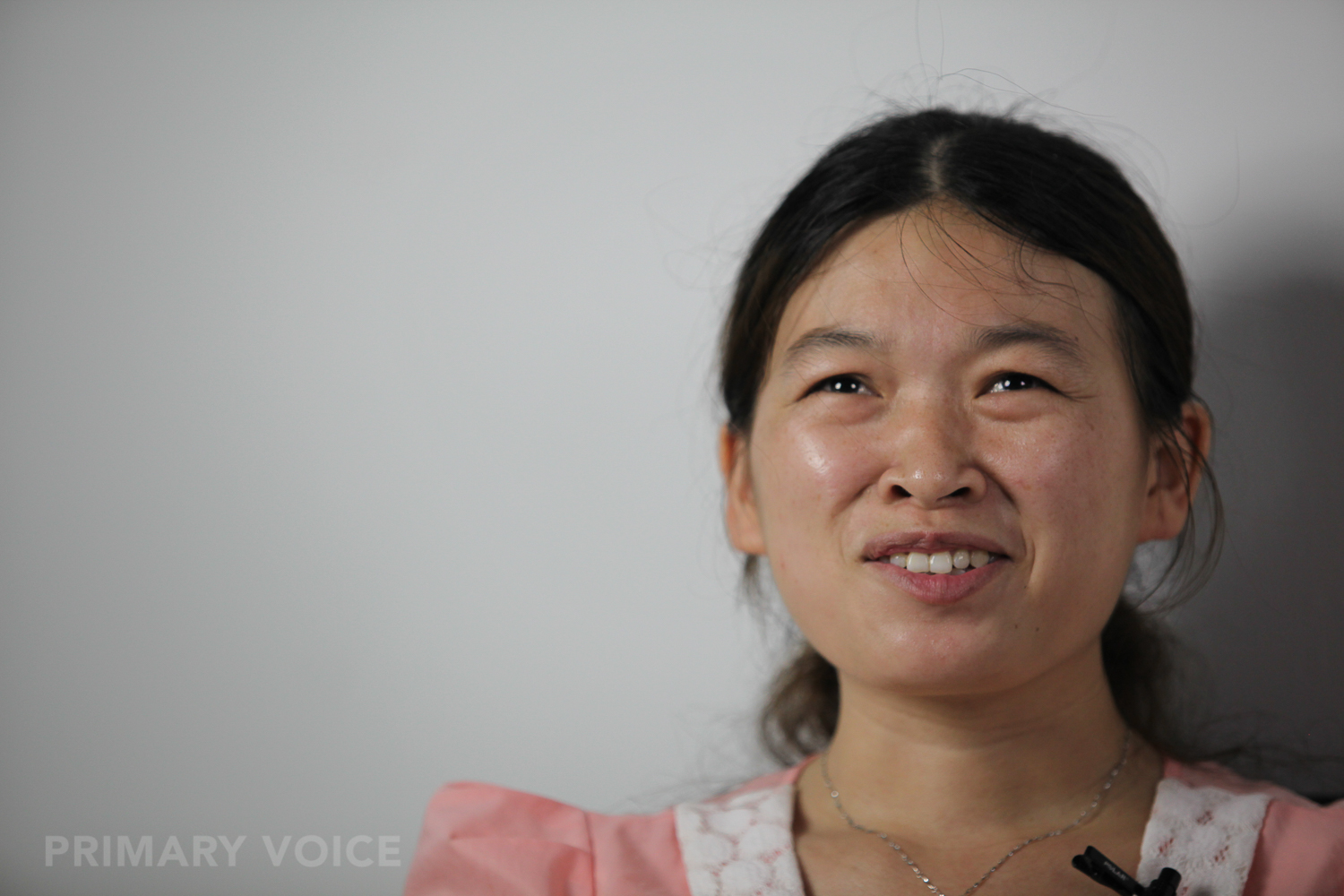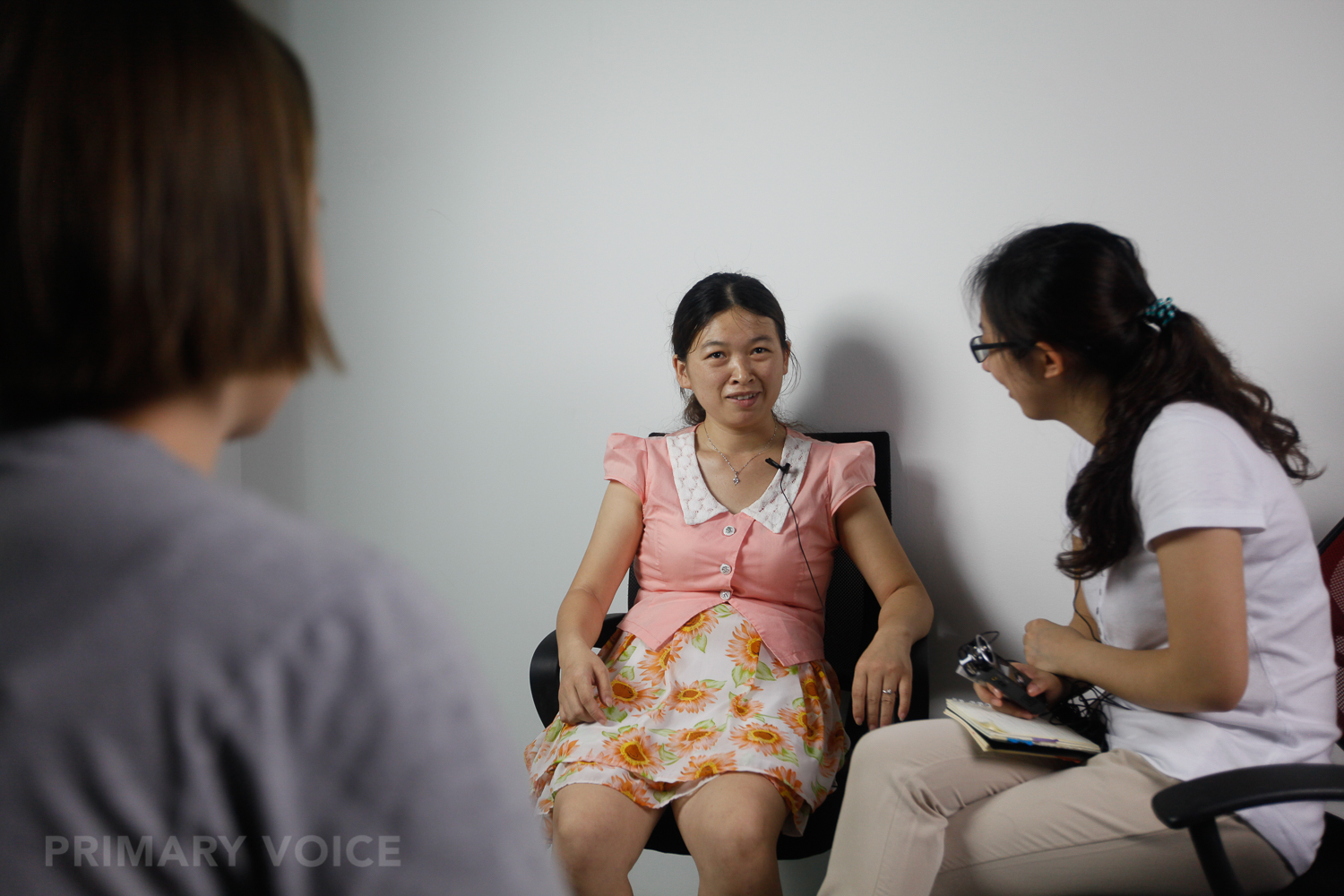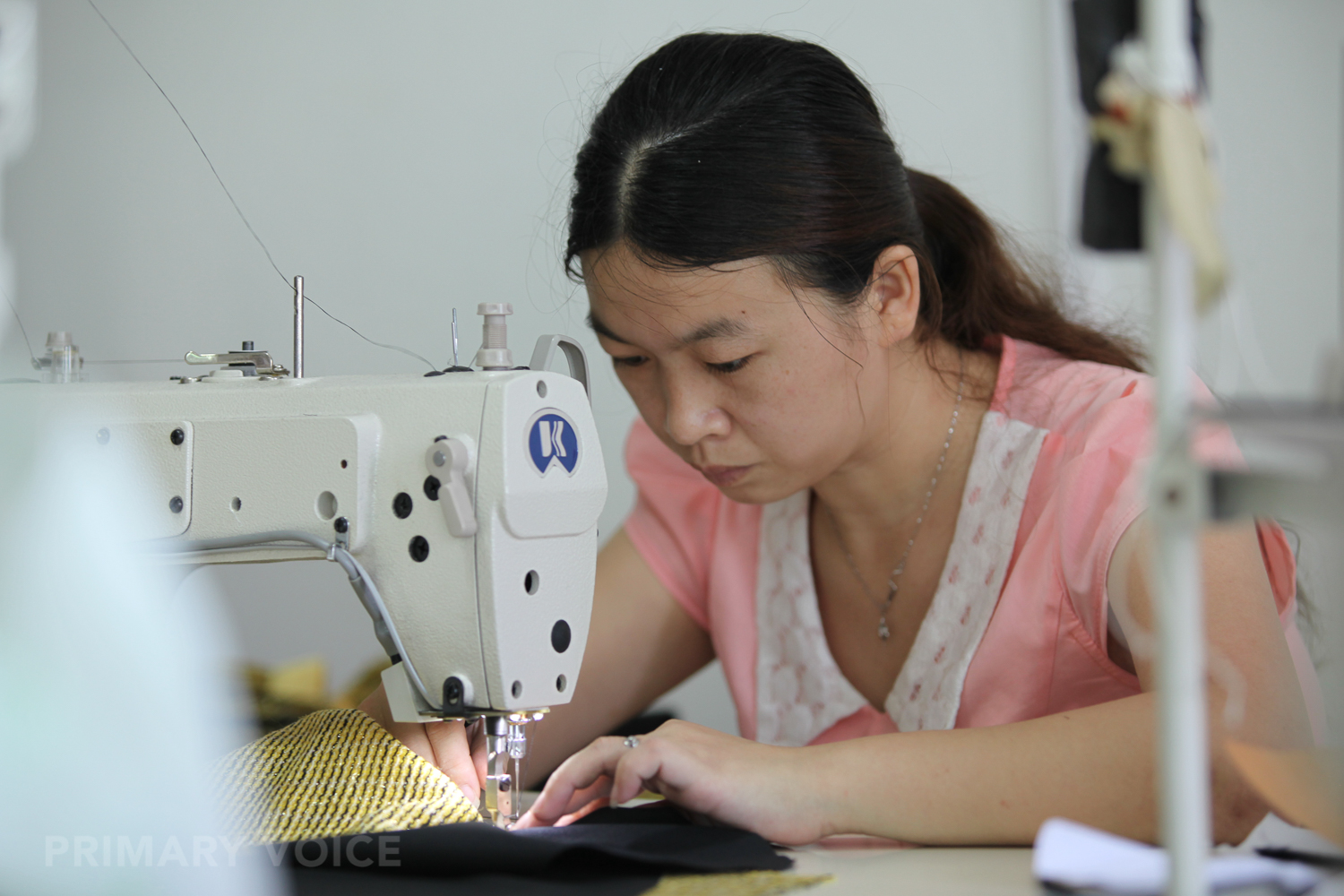Wang is a shy woman. Despite her timid nature, she talked openly of her body and it's awkward transition after marriage and child birth. We discussed at length about her clothes and their relationship to her self-proclaimed introversion. Wang likes clothes and hopes to open a shop of her own one day.
Q: So I just want to start by asking about the outfit you are wearing.
首先我想问问你穿着的这套衣服?
A: 我们自己身上穿得衣服都很一般都是看到喜欢的就买了,很简单的。
I just bought it because I like it. It’s as simple as that.
Q: What do you like about this outfit?
为什么会喜欢这套衣服?
A: 因为我们结婚了以后,身材比较走样,比较…就是比较适合吧,我身材不像以前一样了,这件衣服比较适合我。
When I got married and had children, my body fell out of shape. I think this outfit suits me and fits my body.
Q: What part of your personality do your clothes express?
你认为你穿的衣服是不是体现了你的个性?
A: 反正也不是说有气质,穿得好就行了,像我们一般都简单就行了。
I don’t know how to answer that. I just want to wear something that looks good on me and is simple.
Q: What about the color?
那为什么选这个颜色?
A: 当时也没有什么能挑的颜色,只有这个颜色比较合适。
There weren’t many colors that I could choose from so I picked the one that suits me.
Q: What about the necklace you wear? What is the story behind that?
那你的项链了?有什么背后的故事吗?
A: 这是我结婚的适合送的,我老公送的。
My husband gave it to me as gift when we got married.
Q: Is it instead of a wedding ring or… what symbolism does it hold?
是送项链而不是戒指吗…有什么含义吗
A:跟结婚戒指是配套的。
The necklace and the ring are a pair.
Q: How often do you wear it?
你会经常戴吗?
A: 之前因为这边比较乱,就没有戴,这两年才戴着。
This neighborhood wasn’t very safe several years ago. I have only worn it often in the past two years.
Q: Can I ask about your shoes? What can you tell me about them? Where did you buy them?
能问下你穿的鞋子吗? 能讲讲吗? 你在哪里买的?
A: 这个主要穿的舒服就行了,可以当拖鞋穿。
Wearing them is comfortable and I can wear [them] as slippers too.
Q: What about the color pink? What does the color pink mean to you?
那粉红色呢? 粉红色对你来说有什么含义吗?
A: 不是特别喜欢粉红色,只是巧合。
It is just a coincident that there is so much pink in my outfit. I am not so into pink.
Q: Does the color pink have any meaning in Chinese culture?
粉红色在中国文化中有什么含义吗?
A: 粉红色啊,一般很女性化啊,在中国比较常见,比较多人喜欢。
The color pink is associated with femininity in China. It is a very common color in China and many people like it.
Q: When you go shopping, what kind of place would you go shopping?
一般都去哪里逛街?
A: 一般这几年都没逛过什么街,因为结婚了,都没什么时间去逛街。
I haven’t gone out shopping a lot recently. I haven’t had much time for it after I got married.
Q: How long have you been married?
结婚多长时间了?
A: 六年了。
Six years.
Q: What kind of jobs have you had?
曾经做过什么工作?
A:一直做服装。
I always have been making clothes.
Q: What do you mostly spend your time doing?
那通常都干什么?
A: 除了工作以外,一般都是在家里,照顾小孩,小孩在这边嘛。有两个孩子,一个男孩一个女孩。
Besides work, I usually just stay at home to take care of my children. They are here with me now. I have two kids.
Q: How old are they?
小孩多大了?
A: 女孩六岁,男孩三岁。
My girl is 6 and my boy is 3.
Q: Do they live with you?
他们和你一起住吗
A: 是得
Yes.
Q: How do you feel about having your children with you versus leaving them back in your hometown like so many other women?
你认为把孩子接到身边和把孩子留在老家有什么不同?
A:也不是,我们是隔一段时间接过来。还是在家里那边上学。
My kids don’t stay with me all the time. They go to school back in our hometown and we will bring them here from time to time.
Q: What time of the year do they come here?
什么时候来深圳呢?
A: 一般的话,他们假期长的话就会接过来。反正每一年都会过来,但读书是在老家。
They come here whenever they have long vacations. They come here every year but they go to school in our hometown.
Q: You said that you have been married for six years. Did you come here [to Shenzhen] after you got married?
你说到结婚6年了,是结婚后才来深圳的吗?
A:我一直在这边,我跟我老公是在家里认识的,然后两个人来到深圳。
I have been here [in Shenzhen] all along. I met my husband back home and then we came here together.
Q: How do you feel about your relationship with your husband?
你和你老公感情怎么样?
A: 感情还可以,平时如果老公有时间,会和老公去逛街,如果他没时间,我就自己去。
We have a good relationship. If my husband has time, he will go out shopping with me. If he doesn’t, I will go by myself.
Q: Before you got married, how did you dress?
结婚之前的穿衣风格是怎样的?
A: 怎么说呢,那么多年了。结婚以前都喜欢穿像T恤牛仔裤。比较简单的吧。我喜欢穿得比较简单吧。
I don’t know what to say because that’s a long time ago. I liked wearing t-shirts and jeans before marriage. I like simple style.
Q: How did you change after marriage?
结婚之后穿衣风格有什么不同吗?
A: 结婚之后当然会不同啊,生了小孩之后,身材有点走样。有时候会买大一点的衣服。
I dressed differently after marriage. After I gave birth to my kids my body went out of shape. I started buying clothes with a bigger size.
Q: Did you buy different kinds of clothes when you had children?
有了孩子之后,买会不一样的衣服吗?
A: 会,结婚之后买的衣服都是比较宽松的吧。
Yes, I bought clothes with a bigger size.
Q: How old were you when you started working at a garment factory?
几岁开始就在服装厂工作?
A: 20岁
20 years old.
Q: Has your style been influenced by your work at garment factories?
你的穿衣风格会因为在服装厂工作之后受到影响吗?
A: 也不会,因为我们选衣服都是选比较舒服啊适合我的啊。每个衣服都有每个衣服的特点。
No, when I want to buy clothes I will buy clothes that suit regardless of my work experience in garment factory. I think every type of clothing is unique. They have their own characteristics.
Q: When you were young, how did you imagine you would dress when you grew up?
小的时候有没想过长大以后会穿怎样的衣服?
A: 那时候没想过。
I never thought about it.
Q: I guess I will ask more questions about your life. Growing up in a rural place, what did you dream about your future?
接下来我会问一些关于你个人的问题,以前有没有想过自己的未来。
A: 那时候太小了,哪里会想到这些啊。想过是想过,现在也不知道怎么说,那时候想过要开家自己的店。小时候就想过开个服装店。
I never really thought much about the future when I was little. But I may have had some ideas about it. I wanted to open a clothes store when I was little.
Q: This is like when you are a teenager or little?
是在很小的时候还是青少年的时候?
A: 十一二岁的时候,那时候哪里会想那么多,那时候过得无忧无虑。
When I was about 11 or 12 years old. I had nothing to worry about at that time so I didn’t think a lot about my dreams.
Q: Why did you want a clothes store?
为什么想开服装店呢?
A:怎么说呢,那时候是二十岁的时候才想到的,因为那时候我开始在制衣厂工作,就比较想开店。
I wanted to do this when I started my work at the garment factory at around 20 years old.
Q: Did you want to make clothes or did you just want to have clothes to sell?
你是自己做衣服卖还是去进货卖?
A: 进货吧。
Have clothes to sell.
Q: What are you dreaming about doing now?
现在有什么梦想
A:想过时想过,还是想要开店。
I still want to open a clothes store. I think about it from time to time.
Q: Do you think that is going to happen?
你觉得有没有可能实现呢?
A:计划还是没有,毕竟小孩还太小,没时间啊。
I don’t have any plan yet. I don’t have time for it because my kids are too little and I need to take care of them.
Q: 你作为母亲的角色,会不会影响你将来做得决定?
Your role as a mother, how do you think that will influence your decisions for the future?
A: 也有影响,就这几年也改变不少,也做过其他的,结婚之后也换过几份工作。现在做服装还是觉得毕竟做的年头久嘛。
It will have some influence in the decisions that I make. I have changed a lot in the past few years. I have changed jobs [a few times] after marriage but I still like making clothes [the best] because I have been doing it for many years.
Q: What kind of skills do you have in the garment factory?
在服装厂主要负责什么工作?
A: 裁缝,车衣服。裤子衣服裙子都可以。
Mainly sewing. I can sew pants, shirts and dresses.
Q: What is the biggest part of your identity?
你认为自己最重要的角色是什么
A: 我觉得家庭吧,做母亲和妻子。
I think family means a lot to me. Being a mother and a wife is the biggest part in my identity.
Q: Why is that identity important to you?
为什么觉得做母亲和妻子最重要呢?
A: 我觉得就算你事业再成功。如果没有你个好家庭,也不算很成功。
I think that no matter how much you succeed in your career, if you don’t have a good family, you are not very successful at all.
Q: What kind of values do you have in your family?
你的家庭观念是什么?
A: 反正只要过得好就行了,幸福就行了。
As long as we are having a nice and happy life, that is enough.
Q: When you were growing up, what kind of values did your family had?
你成长的过程中,你的家庭有怎样的观念?
A: 他们没有要求我很多,只要我过得快乐,很快乐就可以了。
My parents didn’t have high expectation of me. They just wanted me to be happy.
Q: Do you have siblings?
有兄妹吗?
A:有个弟弟,有个妹妹。
A younger brother and a younger sister.
Q: What do they do?
他们做什么?
A: 他们也在外打工。
They are migrant workers too.
Q: What kind of jobs do they have?
他们的工作是做什么的?
A:我弟弟去年才结婚,他是做销售,我妹妹是做美甲。
My younger brother got married last year. He is a sales and my sister is a manicurist.
Q: Do you think their lives are affected by their jobs?
他们的工作会影响他们的生活吗?
A:不会
No, I don’t think so.
Q: What do you hope for your children’s future?
你对孩子的未来有什么期望?
A:我不会刻意去规划他们的,也要看他们自己有没有这个心。因为如果他们没那个心,你规划了,他们也会很辛苦。
I won’t make plans for them. It is up to them to make the decisions. If you pave the way for them but they don’t want it, it will be hard for them.
Q: Do your children have subjects or something that they are good at?
小孩有什么什么特长?
A: 我们两个小孩各有各的性格吧。
They are good at different things and they have different personalities.
Q: What commonalities do you see with them in yourself?
你的孩子有没有哪些方面像你?
A: 我儿子比较像我,我也说不好,样子像我,我女儿个性像我。
My son looks like me but my daughter’s personality is more like me.
Q: What aspect of your personality?
你的个性如何?
A:好像比较内向。
I am more introverted.
Q: How has that influenced what you have done in life?
内向的个性会不会影响你的生活呢?
A:也不会,一般我们,看什么场合吧,其实我觉得没有什么影响。
I don’t think it does but it may depend on the circumstance. I don’t feel any influence.
Q: What traits of your personality do you like most?
你最喜欢性格中的哪一方面?
A:我的性格有时候觉得挺好的,有时候觉得不好。也不好说。
I like my introverted personality. I think it can be good or can be bad. It is hard to say.
Q: Do you think your personality will reflect in your clothing?
你觉得你的个性会影响你的穿着吗?
A:也有吧
I think it will.
Q: In what way?
在哪些方面?
A: 像我喜欢穿衣打扮上,会穿那些比较淑女的衣服。也不会说穿得很奇怪,自己也看不惯的。
Like me, I like dressing as a lady. I won’t dress in some eccentric outfit. I don’t like it.
Q: What does it mean to dress like a lady?
穿着淑女是怎样的?
A:穿衣打扮就看自己的心情。怎么说呢。也有穿比较宽松的舒服的,也会穿T恤牛仔裤。
I like to dress in comfortable clothes but I would also wear a t-shirt and jeans sometimes. How to dress may have something to do with your mood.
Q: When you woke up this morning, how did you feel? And how did that influence your dress?
你今天的心情如何? 这会不会影响你的穿衣呢?
A: 也不会很受心情影响,因为上班的话,平时休息还好。不休息的话,要上班的话就比较随便。
I don’t think my mood influenced how I dressed. I don’t think much about what to wear to work. I just wear casual clothes to work but I do think about what to wear when I am off work.
Q: What kind of clothes will you wear when you have days off?
放假的时候穿什么呢?
A:不会上班的时候一般就是穿裙子吧。
I wear dresses when I am off work.
Q: What kind of activities would you do when you have days off?
放假的时候都会做什么去放松?
A:出去玩,逛逛公园,去买生活用品啊。
Going out, going to the park and doing some grocery shopping.
Q: Those are the questions I had, but I wonder if there is anything you want to add or you feel it is important.
我就这么多问题了,你有没有想和我说的话或是想分享的事情?
A:没有,反正我们就是一般人,也没什么藏在心里的话。也有想过把孩子接来,因为小孩在家里是老人照顾,他们都比较老了,孩子在自己身边比较好。
Not much. We are ordinary people and we don’t keep anything in our head. I thought about taking my kids here with me. My kids are staying with their grandparents. They are old and I will feel much relieved when they are here with me.
Q: 你觉得如果孩子在自己身边不是老人带,会不会有什么不同?
Do you think they would be raised differently with their grandparents?
A:小孩的性格可能会不同,公公婆婆年纪大了,跟我们不同,他们比较没时间照顾小孩。
I think my kids would have different personalities. Their grandparents are old and they don’t have enough strength or energy to take care of kids. If they are with me, I would be able to care for them more.
translation by zhu lei




